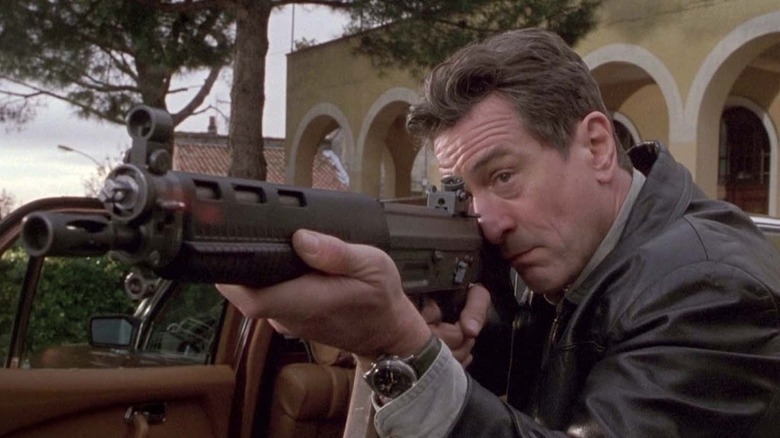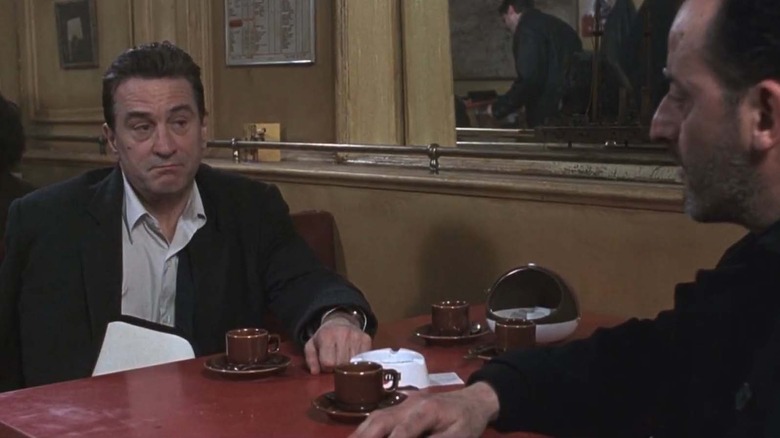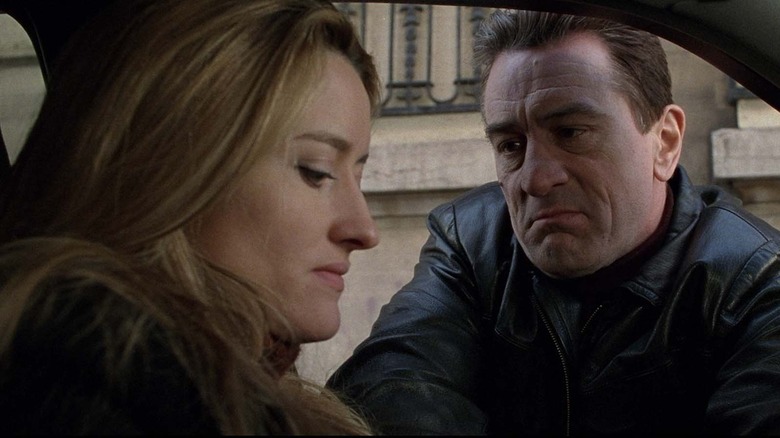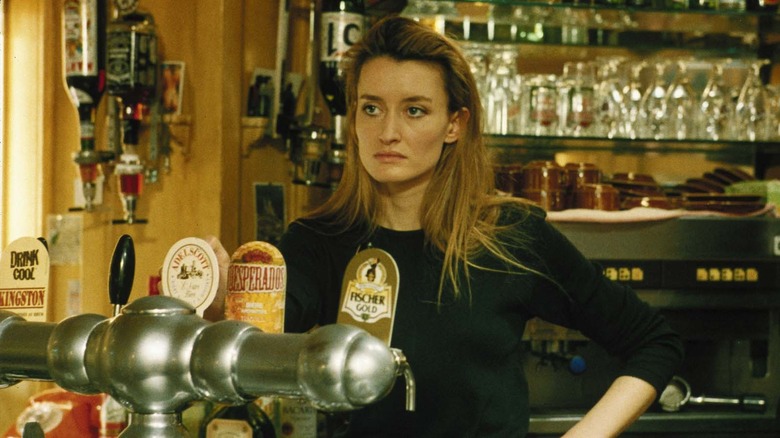The Alternate Ending For Ronin We Didn't See In Theaters
"Ronin," one of my favorite movies of all time, is a stone-cold classic. The 1998 action thriller stars Robert De Niro as Sam — a former-CIA operative hired by the IRA along with a band of fellow mercenaries to snatch a mysterious briefcase. What's in the case? That's not important. What matters is what everyone around him will do to get their hands on it.
A film packed full of double bluffs and double-crosses, "Ronin" employs a stellar ensemble cast including Jean Reno, Natascha McElhone, Stellan Skarsgård, Sean Bean, and Jonathan Pryce. It also uses one of the greatest MacGuffins of all time. The IRA wants it. The Russians want it. The CIA wants to stop whoever is after it. Loyalties continually shift around the briefcase as the former special-ops mercs are revealed to each have motives of their own.
Gregor (Stellan Skarsgård) ultimately betrays the group, nabbing the briefcase during a high-risk ambush on a heavily guarded convoy. Then, it's down to the surviving members of the group to track him down, all while Gregor attempts to sell the case to his former KGB pals. It's a masterclass in storytelling with some of the most realistic car chases ever committed to film. And as the group of Ronin begins to slowly fall apart, it all culminates in a wonderfully poetic ending. But things could've gone much differently, in the form of an alternate ending.
The original ending
Still trying to shift the briefcase despite being betrayed by his Russian contacts, Gregor arranges a meeting with the Russian mafia boss, Mikhi (Féodor Atkine) at Le Zénith — an indoor sports arena where Mikhi's girlfriend and professional ice skater Natacha Kirilova (Katarina Witt) is putting on a show. Revealing that there's a sniper trained on Natacha, Gregor thinks he holds all the cards. But Mikhi doesn't care about his girlfriend and snatches the briefcase before killing Gregor in cold blood. As Natacha is shot dead on the ice, chaos ensues ... and IRA boss Seamus (Jonathan Pryce) shows up to take the case — killing Mikhi in the process.
It's a wonderfully convoluted ending that sees the case change hands several times ... but we're not done yet. Sam and Vincent (Jean Reno) are also there to stop Seamus — the real target of the CIA. Deirdre (Natascha McElhone) awaits as Seamus' getaway driver ... but Sam (who seems to actually care about her) convinces her to leave. After a brief, but exciting shootout, Seamus is foiled.
We then cut to a quiet scene in a French bistro, where Sam and Vincent reflect on everything that's happened. "She would not be coming back here," says Vincent. And Sam agrees — it's likely he'll never see Deirdre again. The pair go their separate ways, with Sam returning to his CIA handlers while Vincent reflects further on the nature of their work as "Ronin" fades to black.
But what happens in the film's alternate ending?
The alternate ending
All the action leading up to Seamus' untimely death is exactly the same, with Gregor, Mikhi, and poor Natacha being offed in the process. Essentially, it's just the bistro scene at the end that's been changed.
It's a subtle difference, but you'll notice that Sam and Vincent's conversation is now punctuated with scenes of Deirdre, who in the theatrical version drives away during the climactic shootout never to be seen again.
This time around, she's back and considering her options. Returning to the bistro in Montmartre where she first assembled her team of mercenaries, the Irish operative considers joining Sam and Vincent. But she has second thoughts. "She would not be coming back here, would she?" says Sam as we watch Deirdre emotionally turn her back on the bistro and head to her car.
But she doesn't get to drive off into the sunset this time.
As she's about to get into her car, a van full of IRA men turn up, grabbing her off the street and kidnapping her as they call her a traitor. It's heavily implied that she'll be killed for her insubordination. And as Sam exits the bistro, he looks around, oblivious to the fact that he was so close to seeing her once again.
Why the alternate ending was canned
The ending we see in the theatrical cut of "Ronin" is just about perfect. The quiet contemplation following the high-stakes action scenes gives the two thoughtful mercs time to evaluate. Reno's monologue sums it all up rather nicely:
"No questions. No answers. That's the business we're in. You accept it and move on. Maybe that's lesson number three."
So, why wasn't the film's alternate ending used? That's one question that can be answered. During the film's audio commentary, director John Frankenheimer explained it: "We tried that ending, and the audience really hated it."
It turns out that the alternate ending was actually the ending that was originally filmed, but test audiences were unhappy. The rather finite ending for Deirdre proved to be too much, and so it was edited into the theatrical ending we see today. In fact, you can still see a remnant of the original ending, when Robert DeNiro exits the bistro and looks around — presumably hearing Deirdre's screams as she's dragged off into the van. However, it still works in the final cut, coming across as a pensive glance, instead.
Despite audience reactions, Frankenheimer preferred the original ending, saying that it "really worked." But I have to disagree. I can't help feeling that the addition of Deirdre's kidnapping disrupts the flow of DeNiro and Reno's final scene, adding nothing but a small measure of dramatic irony. Ultimately, Frankenheimer chose to edit it down, explaining that "with the tremendous investment [the studio] had in this movie, you have to kind of listen to the audience."
But it turns out Frankenheimer also filmed a second alternative ending.
A bit 'too Hollywood'
The second alternative ending sees the scene play out as per the theatrical cut, with Sam and Vincent eventually going their separate ways. But then, we see Deirdre Walking to her car before driving off into the sunset.
Again, test audiences hated it.
This time, they felt it was just "too Hollywood" allowing Deirdre to drive off into the sunset. They also thought that this ending hinted towards a sequel, with the three mercenaries able to team up once more ... as soon as the heat had died down.
Of course, that wasn't what Frankenheimer was going for, either. So, he made the choice to cut the original ending into what we see today — a much tighter, more streamlined version that gives Sam and Vincent room to think. In the end, it feels as though Frankenheimer made the right choice, leaving "Ronin" with a quiet and thoroughly pensive ending to a truly captivating thriller.



